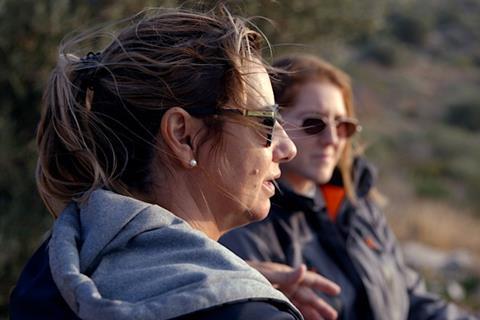This sensitive documentary follows two Greek female sailors as they seek justice for institutional sexual abuse

Dir: Vania Turner. Greece. 2024. 96mins
When the Harvey Weinstein sex abuse scandal broke in 2017, it sparked the #MeToo movement that travelled around the globe. Many of the accusations that surfaced pointed to institutional problems and a widespread culture of denial. This domino effect reached Greece in 2020, when Olympic gold medal winning sailor Sofia Bekatorou revealed she had been raped several years earlier by a senior member of the Hellenic Sailing Federation national governing body.
An emotionally charged documentary that carefully supports its subjects
First-time feature director Vania Turner picks up the story after Sofia’s courage prompts younger sailor Amalia Provelengiou to contact her and reveal she was repeatedly abused and raped by her coach when she was only 12 years old. The resulting documentary, which premieres in the Newcomers International Competition at Thessaloniki International Documentary Film Festival, follows both women. Amalia decides to testify against her attacker and begins the arduous court processs, while Sofia, whose alleged rapist cannot be charged due to the statute of limitations, supports her at the same time as campaigning for changes in the law.
Although this insiders’ view of the case will inevitably hold the most interest for local audiences in Greece, its universal themes surrounding the abuse of power and denial, both institutional and societal, should see it gain a foothold on the festival circuit elsewhere.
Greek-British director Turner takes an intimate approach to the subject, the close access no doubt helped by the fact that she acts as her own cinematographer. Stepping inside the homes of both women, Turner not only documents the impact of Amalia’s case on them but on their loved ones. Amalia had, in fact, spoken out about her rape years earlier even though her attacker had threatened to kill her, and her mum and dad, if she did. Her parents attempted to get police action on the subject, only to be told to come back “with evidence”.
Sofia’s relationship with her elderly father regarding her own revelations is shown to be more complex and difficult. A conversation she has with him about not being believed has a resonance that goes beyond their family, and brings home the barriers many survivors face as they try to get justice.
Amalia was still in junior school when her attacker began to target her, and Turner makes sure we understand what being an 11 or 12-year-old child looks like; photographs and archive footage reinforce her youth. This approach is important as it makes subsequent testimony suggesting that the sex was consensual and in which Amalia is described as “one sly fox” all the more abhorrent. Indeed, Tack highlights not just the way in which court cases cause attack survivors ongoing trauma as they give evidence and face an often aggressive defence, but the problems – replicated across the globe – of slow-moving legal systems that are often subject to postponements.
The trial of Amalia’s attacker, which dominates the latter part of the film, took place behind closed doors and is reproduced here by animating black and white court sketches made by Georgia Zachari. The result is simple but effective. Rather than revoice the testimony, sound design from Dimitris Miyakis blends with Nikos Veliotis’ scoring to create a sort of background of muffled and inaudible speech as what was said appears in subtitles. In the original Greek some of the words are highlighted, meaning a little of the effect is lost in the English subtitling. There are also portions of the film unecessarily subtitled in block capitals, making them more difficult to read quickly.
Turner’s attempts to broaden the debate out into a scrutiny of institutional denial do not have the incisiveness or detail of the rest of the film but, as Sofia’s case was high-profile in her home country, it may be that Greek audiences will more easily fill in the gaps. The director’s rendering of key parts of the court case in unfussy terms, however, allows the absurdity of some of the testimony to hit home – particularly that of another mother who offers up a classic example of victim blaming. The result is an emotionally charged documentary that carefully supports its subjects while highlighting the wrong-headedness of victim blaming, and suggests the road to justice continues to be far too difficult a journey.
Production companies: Onassis Culture
International sales: Neda Film amanda@nedafilm.gr
Producers: Afroditi Panagiotakou, Dimitris Theodoropoulos
Cinematography: Vania Turner
Editing: Vania Turner, Nikoleta Leousi
Music: Nikos Veliotis















![[L-R]: Amanda Villavieja, Laia Casanovas, Yasmina Praderas](https://d1nslcd7m2225b.cloudfront.net/Pictures/274x183/6/4/1/1471641_pxl_20251224_103354743_618426_crop.jpg)








